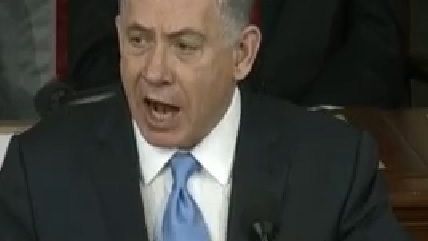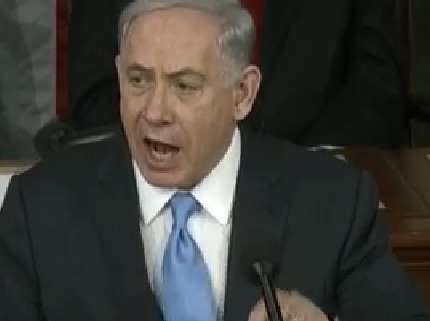Netanyahu Address to Congress Same Old Argument Against Iran Negotiations
Israeli prime minister insisted his visit wasn't political, stuck to most of his same talking points.


Israeli Prime Minister Benjamin Netanyahu addressed a joint session of Congress this morning, sans Vice President Joe Biden and more than 50 other Democrats, as well as Rep. Walter Jones (R-N.C.), who skipped Netanyahu's third appearance in Congress.
In 2002 Netanyahu testified on Iraq before the House government affairs committee. There he guaranteed that taking out Saddam Hussein would "have enormous positive reverberations on the region." Kerry pointed out the wrongness of these comments but not that his rhetoric on Iraq's (non-existent) nuclear capabilities matched Netanyahu's, and most of Washington's. In 2011 Netanyahu addressed a joint sessions of Congress, warning of the threat of a nuclear Iran, something he has a long history of overblowing.
The Israeli prime minister began his address this morning by insisting his appearance, which has divided Congress on an Israel-related issue in a way the highly partisan body usually doesn't divide on Israel, wasn't meant to be political and re-iterating his belief that President Obama has supported Israel as strongly as any other president. He sought to connect the Islamic Republic of Iran with the Islamic State in Iraq and Syria (ISIS), the terrorist group the U.S. has at least passively worked against alongside Iran. The Iraqi army launched an offensive to retake Tikrit from ISIS this week, enjoying U.S. air support for sorties and Iranian strategic advice on the ground. To Netanyahu, the struggle between Iran and ISIS is a "deadly game of thrones" over which one would represent militant Islam.
Netanyahu's primary stated goal before Congress was to argue against a deal being negotiated between the U.S., Russia, China, the U.K., France, Germany, and Iran over the latter's nuclear program. Netanyahu insisted he wasn't revealing any secret information—and did not appear that—but that most of what he was talking about was just a Google search away.
According to Netanyahu, the potential deal with Iran would not require any nuclear facility to be demolished, leaving a short "break out" time for Iran to develop a nuclear weapon if it chooses to—about a year, by design. Netanyahu said he was also concerned because the restrictions on Iran's nuclear programs would be supervised by international inspectors. "Inspectors document violations," Netanyahu said, "they don't stop them," pointing to North Korea's work toward a nuclear weapon while inspectors were active in the country. Netanyahu also blasted the ten-year time frame envisioned for the deal, saying it may seem like a long time politically but that it was "a blink of an eye in the life of a nation… in the life of our children."
Netanyahu insisted a deal structured this way would pave, not block, the way for Iran to acquire a nuclear bomb, suggesting support for the deal hinged on either the assumption that the deal would lead to positive changes in Iran or that alternatives to the deal would be worse. Netanyahu disagreed, saying the deal "would spark a nuclear arms race in the most dangerous part of the world." He did not mention Israel's own nuclear weapons capabilities—the only country in the region believed to have nuclear weapons—or why those capabilities haven't already led to nuclear proliferation in a region where most of its neighbors consider it an enemy.
Netanyahu said Israel could "literally" live with a deal that it opposed that was better than the one described in press reports. He insisted a deal ought to require Iran to stop its aggressive foreign policy against its neighbors in the Middle East, a vague assertion because it was not a reference to Iran's sponsorship of terrorist organizations in the region—that was a separate demanded pre-condition for a deal. Netanyahu also demanded Iran stop threatening to annihilate Israel before any deal is reached. Netanyahu advised members of Congress, some of whom, Republican and Democrat, have been skeptical of the Iran negotiations, that Iran's threats to walk away from negotiations was a bluff the U.S. should call Iran on.
Netanyahu concluded by pointing to Holocaust survivor Elie Wiesel, who was in the gallery, and pledging that "the days when the Jewish people remain passive in the face of genocidal threats" was over and that "even if Israel has to stand alone, Israel will stand." Israel has run bombing operations in neighboring countries to stop weapons programs before. In the 1980s Israel bombed a nuclear facility in Iraq and it's believed to be responsible for several aerial sorties against weapons facilities in Syria.
As Netanyahu acknowledged at the beginning of his speech, the U.S. has been a huge source of military support for Israel. As one of the most prosperous countries in the region and the world, Israel could certainly cover all of its military and other expenditures, without aid from the U.S. That aid, theoretically, prevents Israel from conducting its foreign policy the way it wants to. Absent aid would Israel have already struck against Iran's nuclear capabilities? It's hard to tell. Today's speech was as much about convincing on-the-fence members of Congress to be more skeptical of a deal as it was in convincing Israeli voters back at home that they should re-elect him to keep leading the country as it faces what he insists is an existential threat. And in that case, it's a far less costly move than actually starting a war for some political capital.
Watch the whole speech here.
Show Comments (100)